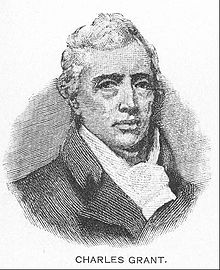Regency Personalities Series
In my attempts to provide us with the details of the Regency, today I continue with one of the many period notables.
Charles Grant (British East India Company)
16 April 1746 – 31 October 1823

Charles Grant
Charles Grant (British East India Company) was born at Aldourie, Inverness-shire, Scotland on the same day his father, Alexander Grant, was killed fighting for the Jacobites, against the British Crown, at Culloden. However, Charles Grant himself was one of the growing number of Scots who prospered in the service of the British Empire. In 1767, Grant travelled to India to take up a military position. Over subsequent years, he rose in the ranks of the British East India Company. Initially, he became superintendent over its trade in Bengal. Then, in 1787, having first acquired a personal fortune through silk manufacturing in Malda, Lord Cornwallis the Governor-General appointed Grant as a member of the East India Company’s board of trade. Grant lived a profligate lifestyle as he climbed through the ranks, but after losing two children to smallpox he underwent a religious conversion. Viewing his life, including his efforts in India, from his new evangelical Christian perspective, moulded his career for the rest of his life.
Grant returned to Britain in 1790 and was elected to Parliament in 1802 for Inverness-shire. He served as an MP until failing health forced him to retire in 1818. However, his relationship with the East India Company did not end. In 1804, he joined the Company’s Court of Directors, and in 1805, he became its chairman. He died in Russell Square, London at age 77.
His eldest son, Charles, was born in India and later followed his father into politics, eventually becoming a British peer as Baron Glenelg. His other son, Robert, followed his father into the Indian service and became Governor of Bombay, as well as being a Christian hymn writer.
Grant opposed the Governor-General Richard Wellesley’s combative and expansionist policies in India, and later supported the unsuccessful parliamentary move to impeach Wellesley. Grant saw Indian society as not only heathen, but also as corrupt and uncivilised. He was appalled by such native customs as exposing the sick, burning lepers, and sati. He believed that Britain’s duty was not simply to expand its rule in India and exploit the subcontinent for its commercial interests, but to civilise and Christianise.
In 1792, Grant wrote the tract “Observations on the State of Society among the Asiatic Subjects of Great Britain.” This famous essay pled for education and Christian mission to be tolerated in India alongside the East India Company’s traditional commercial activity. It argued that India could be advanced socially and morally by compelling the Company to permit Christian missionaries into India, a view diametrically opposed to the long-held position of the East India Company that Christian missionary work in India conflicted with its commercial interests and should be prohibited. In 1797, Grant presented his essay to the Company’s directors, and then later in 1813, along with the reformer William Wilberforce, successfully to the House of Commons. The Commons ordered its re-printing during the important debates on the renewal of the company’s charter.
He was largely responsible for the foundation of East India Company College, which was later erected at Haileybury.
As Chairman of the Company, Grant used his position to sponsor many chaplains to India, among them Claudius Buchanan and Henry Martyn.
Grant was part of an evangelical Anglican movement of close friends which included such luminaries as the abolitionist Wilberforce, Zachary Macaulay, John Venn, Henry Thornton, and John Shore, who lived in close proximity round Clapham Common south west of London. For some years from 1796, Grant himself lived in a large villa called Glenelg in proximity to Wilberforce and Thornton. This ‘Clapham sect’ welded evangelical theology with the cause of social reform. Both in India and in Britain’s Parliament, Grant campaigned for the furtherance of causes of education, social reform, and Christian mission. In 1791, he helped established the Sierra Leone Company, which gave refuge to freed slaves. Also in 1791, as an influential supporter of the abolition of slavery in all its forms, he was elected to the London Abolition Committee. He served as a vice-president of the British and Foreign Bible Society from its establishment in 1804, and also supported the Church Missionary Society and the Society for the Propagation of the Gospel. As a director of one of the largest businesses of the day, Grant was a remarkably effective social reformer.






























